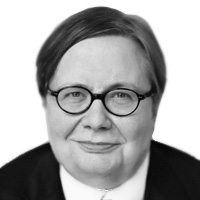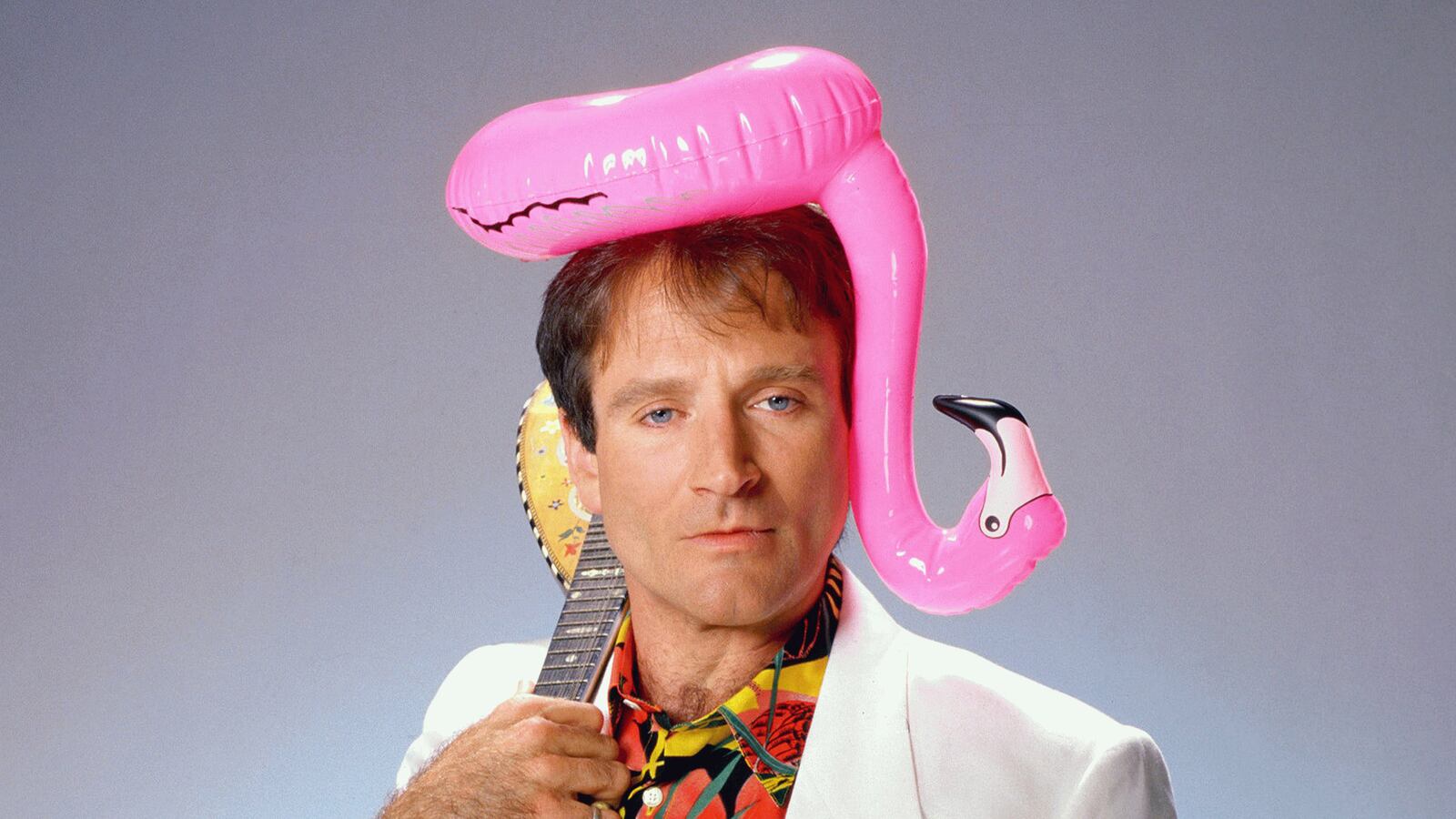On television, the death on Monday of actor and comedian Robin Williams was hyped as ‘Breaking News,” but they could justifiably have filed it under “heartbreaking news” as well.
Of entertainers born in the second half of the 20th century, not very many earned the adjective “beloved,” partly because sentimentality about show business became a pretty antiquated concept and partly because vaudeville was dead and performers now faced audiences electronically rather than intimately, increasing the distance between star and star-gazer.
Robin Williams Dead at 63: His Life in Photos

And yet Robin Williams, who died yesterday at a young 63, really did seem beloved for most of his 40-plus years in the spotlight, going all the way back to Mork and Mindy, the simple-minded spin-off of an even simpler-minded series called Happy Days and like it, a seminal sitcom of the ’70s.
Williams was the little round hairy guy who made us laugh and whose comedy always seemed tinged with sweet innocence, no matter how political or otherwise topical it might have been.
The notion that inside the funniest of comedians suffers the tormented soul of a poet seemed confirmed with the troubling news that Williams had “apparently” taken his own life.
In a touchingly worded statement on the actor’s death, President Obama noted the irony of Williams having been “one of a kind” even though he played a great number and wide variety of roles, many of them daffy and eccentric.
He was a one-of-a-kind traveling repertory company, not an Everyman so much as a raging raggedy chorus of Everymen, their infinite variety endlessly amusing.
As his career romped on, Williams made the variety of roles wider and wider, branching out into semi-serious and serious parts and even winning the Oscar for his performance in Good Will Hunting, having been by far the best thing in the picture.
He continued to amaze and impress by facing more and greater challenges, moving his status as far from “sitcom star” as he could get it, even though—unlike some stars who make their first fame in TV—he generally refrained from trashing the vehicle in which he’d arrived.
Instead, in brash and definitive stand-up performances, he’d laugh at himself, envisioning a has-been of the future stumbling about, babbling of past glories, and misquoting the egg-hatched Mork’s own trademark as “ninny ninny” when of course what Mork had said was “na-nu, na-nu.”
Those who appreciated Williams most not for his TV work—or for such films as the fashionable Good Morning, Vietnam or the warm-hearted Mrs. Doubtfire or the gay-themed Birdcage—but instead for his near-heroic solo performances at the Metropolitan Opera House (in 1986) and other tony venues, knew all along there was a great actor inside that shockingly hair-covered skin.
Williams helped bring new heft and, oddly or not, even new dignity to the job of stand-up comedian, climaxing one of his most memorable one-man shows with an unforgettable re-enactment of his own birth.
It was harrowing and hilarious—brilliant and frightening—a tour de force from a forever-young man who used his comedy to explore and lampoon the human condition in ways that most comics would not attempt.
Williams’ coronation as a clown prince of his times probably occurred earlier, at the Copacabana nightclub in New York, which briefly re-opened in the 1970s with music and comedy acts.
Williams played six nights there in 1979, and opening night brought out a crowd of comedy royalty that included much of the early cast of Saturday Night Live—among them Gilda Radner and Bill Murray, who was there with his mother and his actor-brother Brian Doyle Murray—as well as Andy Kaufman, Andy Warhol, and old-time comedian Joey Adams, who barely laughed a stitch and shook his head in bewilderment. A new generation was taking over.
Although one of those members of young comic royalty commented after the performance that “there wasn’t one really new thing there,” it wasn’t the ingredients that made Williams so wondrous to watch, it was the way he combined them, whipping them up, swirling them crazy, spewing them out into the crowd, which had its work cut out for it just identifying each of them as it flew by.
Pauline Kael proclaimed that Williams put the culture “through a duck press,” as if we were all familiar with duck presses and maybe had one in a kitchen cupboard, and yet it sounded like it made sense.
Kael was not always a fan of Williams’ “serious” acting, charging that in such films as the slobbery Awakenings he was relegated to “benevolent eunuch roles.” But the Oscar put the kibosh on doubters; certainly nobody demanded a recount, save perhaps the four losers in his category.
Williams was a nightmare for an interviewer—a print interviewer, that is—because you’d spend an hour or so with him (as I did in his Mork and Mindy trailer one afternoon ages ago) laughing your brains out and imagining the hilarity you’d commit when writing the piece, only to discover when you looked at your notes or listened to the tape that very little of it even made sense when separated from Williams’ wild-eyed delivery—much less seemed funny. He was not translatable to the printed page.
His medium and message were one. He didn’t just take the stage but stormed it, as if there were a whole crowd of him, and he’d win over the audience or, one almost feared, collapse trying.
Witnessing these comedy concerts of his, you may have felt afterward as if you’d been up there onstage with him, sweating and twirling, jumping up and down, guzzling down bottles of water to hydrate and then launching into some random new impression, tearing into some new topic, bouncing off whichever wall you hadn’t bounced off lately.
Speaking of daffiness and of ducks, it was a little like watching Daffy Duck careen around inside a six-minute cartoon, but much longer and more exhausting, mentally and physically.
Of course, Williams slowed down in later years, and when he returned recently to the sitcom format on a typically negligible CBS series (The Crazy Ones, canceled in May after one season), he was not the speed freak he’d been at the beginning. He didn’t try to be; that would have been sad.
Even in his impish youth (he was 26 when he starred as Mork), Williams had traces of a little old man in his facial features, as if there were a wise old grandpa in there waiting to break through the outer boyish surface.
He would have been, no doubt, wonderful in character roles if he’d lived, as he should have, to a proverbial ripe old age.
News reports stressed his battles with addictive substances, including alcohol and cocaine, over the years, but one always felt with Robin Williams that if there was no such thing as a drug on the planet, he would have found something to abuse in his ongoing battle with whatever demons (also cited widely in obituaries) rampaged inside him.
Perhaps those same demons helped him create the comedy with which he savagely entertained great roaring masses of the deeply appreciative.
Fans of a certain generation or two revere Williams for performances in films that verged on the maudlin—Dead Poets Society, for one, in which the teacher that Williams plays seems most intent on lionizing not poetry but himself.
Williams could perhaps get away with it and make those films work because he was held in deep affection for having so unfailingly made us laugh. He did that for 40 years, and yet there was still a meteoric quality to his career—meteoric not for its speed but for its having been a rare cosmic event. The kind, indeed, that you never forget.




